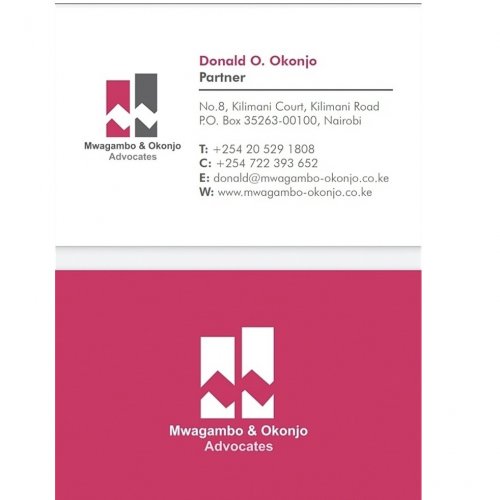Best Project Finance Lawyers in Nairobi
Share your needs with us, get contacted by law firms.
Free. Takes 2 min.
List of the best lawyers in Nairobi, Kenya
Legal guides written by Adroit Law LLP:
- Kenya Launches Digital Nomad Visa: A Gateway for Remote Workers
- Navigating the Payment System License Maze in Kenya
- Navigating the Complexities of Mining Licenses and Permits in Kenya: A Look into Artisanal and Large-Scale Operations
About Project Finance Law in Nairobi, Kenya
Project finance is a specialized financial structure where the repayment of loans and investments is primarily reliant on the cash flow generated by a specific project, rather than on the general assets or creditworthiness of the project sponsors. In Nairobi, Kenya, project finance is commonly used for large-scale infrastructure, energy, real estate, and public-private partnership (PPP) initiatives. The legal framework encompasses commercial, financial, regulatory, and contractual arrangements to facilitate successful project execution while managing risks for all parties involved.
Why You May Need a Lawyer
Engaging a lawyer specializing in project finance is essential for several reasons:
- Drafting and negotiating complex contracts such as loan agreements, EPC contracts, and concession agreements
- Structuring the transaction to ensure legal and commercial viability
- Due diligence on project sponsors, land rights, permits, and regulatory compliance
- Managing environmental and social impact compliance as required by law
- Securing financing from local and international lenders
- Mitigating risks related to political, currency, regulatory, or construction issues
- Resolving disputes between project parties
- Compliance with local content and employment regulations
- Transferring or refinancing the project at different stages
Given the high value, complex stakeholder involvement, and regulatory scrutiny typical for project finance in Nairobi, a qualified legal professional can help safeguard your investment and interests.
Local Laws Overview
Project finance in Nairobi is governed by a combination of national laws, regulations, and international best practices. Key legal aspects include:
- Public-Private Partnerships Act: Guides PPP frameworks, procurement, and dispute resolution
- Companies Act: Governs the formation and operation of special purpose vehicles (SPVs)
- Land Act and Land Registration Act: Regulate land acquisition, leasing, and registration processes
- Environmental Management and Coordination Act: Stipulates the need for Environmental Impact Assessments (EIA)
- Banking Act and Capital Markets Authority Regulations: Address lending, borrowing, and securities for project financing
- Foreign Investment and Protection Act: Offers protection and incentives for foreign investors
- Local Content Laws: Require involvement of Kenyan goods, services, and labor in certain sectors
- Tax Laws: Cover tax incentives and liabilities for project finance structures
Understanding and complying with these local laws is crucial for any successful project finance arrangement in Nairobi.
Frequently Asked Questions
What is project finance and how does it work in Kenya?
Project finance in Kenya is a funding structure where repayment relies on the future cash flows generated by a specific project. It is mostly used in sectors like energy, infrastructure, transport, and public-private partnerships. Lenders and investors assess the project's ability to generate revenue, not just the creditworthiness of the project sponsor.
What types of projects are typically financed through project finance in Nairobi?
Common projects include energy plants, toll roads, water projects, real estate developments, and infrastructure projects under public-private partnerships.
What role does an SPV (Special Purpose Vehicle) play in a project finance transaction?
An SPV is a separate legal entity created solely to execute and manage the specific project. It isolates risks, manages contracts, and is the main borrower or issuer of project debt.
What risks are involved in project finance?
Risks include construction delays, cost overruns, regulatory changes, environmental issues, exchange rate fluctuations, revenue shortfalls, and political risk. A lawyer can help identify, allocate, and mitigate these risks through contractual arrangements.
Are there any special regulations for foreign investors in project finance?
Yes. Kenya has laws encouraging foreign investment while protecting local interests. Foreign investors often need to follow capital importation, land ownership, and sector-specific regulations, as well as secure approvals from relevant authorities.
What is the process for securing project finance in Nairobi?
The process typically involves feasibility studies, legal due diligence, obtaining permits and clearances, establishing an SPV, negotiating financing and operational agreements, and securing regulatory approvals.
Do project finance arrangements require environmental approvals?
Yes. All significant projects must undergo Environmental Impact Assessments (EIA) and obtain approvals from the National Environment Management Authority (NEMA).
Can disputes in project finance be resolved outside court?
Yes. Many contracts provide for mediation, arbitration, or other forms of alternative dispute resolution, which are recognized and enforceable under Kenyan law.
What tax incentives are available for project finance?
Kenya provides various tax incentives for large-scale infrastructure, energy, and priority sector projects. These may include tax holidays, investment deductions, and exemptions, subject to proper compliance and approvals.
How can a project finance lawyer assist in a cross-border transaction?
A lawyer experienced in cross-border project finance will help navigate Kenyan as well as international laws, ensure proper documentation, advise on legal risks, coordinate with foreign counsel, and facilitate regulatory approvals and compliance.
Additional Resources
For further guidance and updated information, consider consulting the following resources:
- Kenya Law Reports - for access to statutes, legal notices, and case law
- Public-Private Partnerships Directorate (National Treasury)
- National Environment Management Authority (NEMA)
- Capital Markets Authority (CMA)
- KenInvest (Kenya Investment Authority)
- Law Society of Kenya - lawyer directory and legal resources
- Ministry of Lands and Physical Planning
Next Steps
If you are considering a project finance transaction in Nairobi, it is important to:
- Identify and outline your project objectives, sector, and potential partners
- Consult with a qualified project finance lawyer early in the planning stage
- Prepare all relevant documentation, including feasibility studies and business models
- Conduct necessary due diligence on project location, permits, and regulatory compliance
- Engage with government authorities for required approvals
- Secure stakeholder buy-in and clarify contractual obligations between all parties
- Explore appropriate financing options and negotiate terms with lenders or investors
- Ensure active management of legal, financial, and regulatory risks throughout the project lifecycle
A project finance lawyer can provide essential legal advice, help avoid common pitfalls, and guide you successfully through each step of the transaction. Do not hesitate to seek professional assistance as early as possible.
Lawzana helps you find the best lawyers and law firms in Nairobi through a curated and pre-screened list of qualified legal professionals. Our platform offers rankings and detailed profiles of attorneys and law firms, allowing you to compare based on practice areas, including Project Finance, experience, and client feedback.
Each profile includes a description of the firm's areas of practice, client reviews, team members and partners, year of establishment, spoken languages, office locations, contact information, social media presence, and any published articles or resources. Most firms on our platform speak English and are experienced in both local and international legal matters.
Get a quote from top-rated law firms in Nairobi, Kenya — quickly, securely, and without unnecessary hassle.
Disclaimer:
The information provided on this page is for general informational purposes only and does not constitute legal advice. While we strive to ensure the accuracy and relevance of the content, legal information may change over time, and interpretations of the law can vary. You should always consult with a qualified legal professional for advice specific to your situation.
We disclaim all liability for actions taken or not taken based on the content of this page. If you believe any information is incorrect or outdated, please contact us, and we will review and update it where appropriate.

















